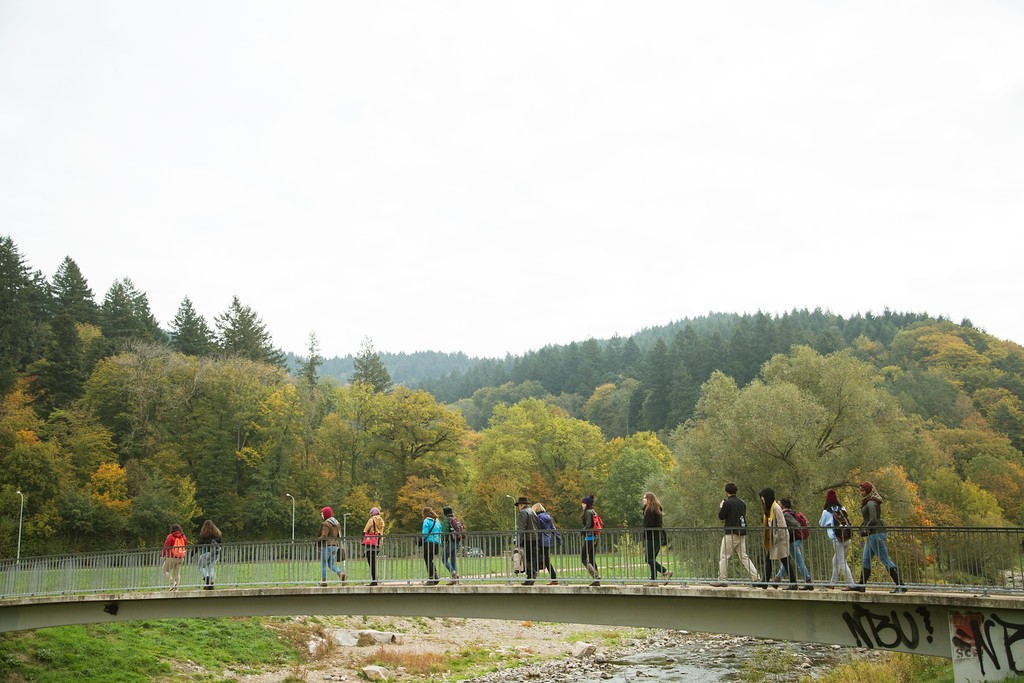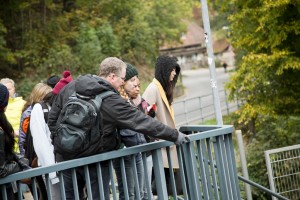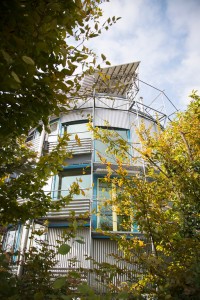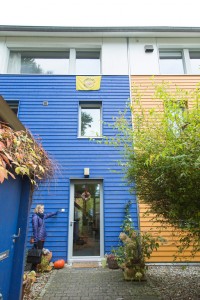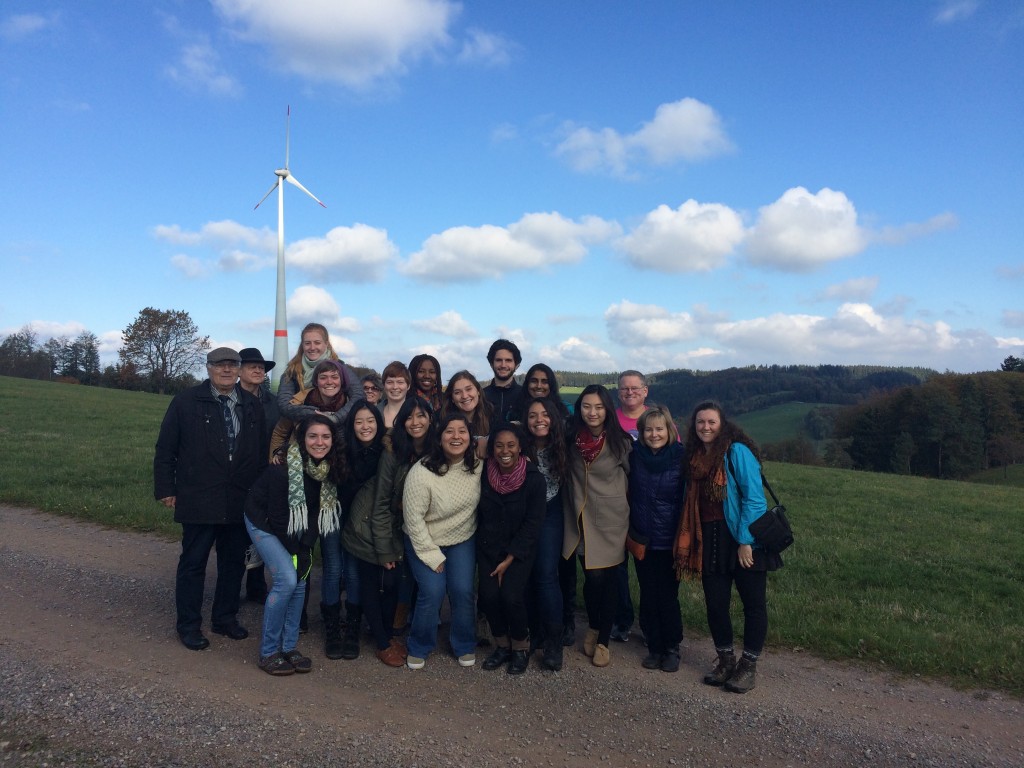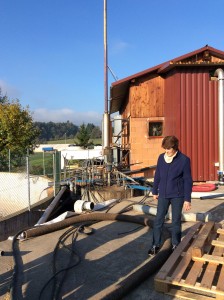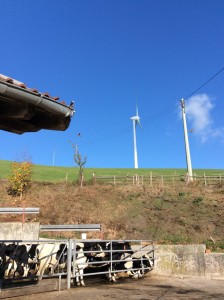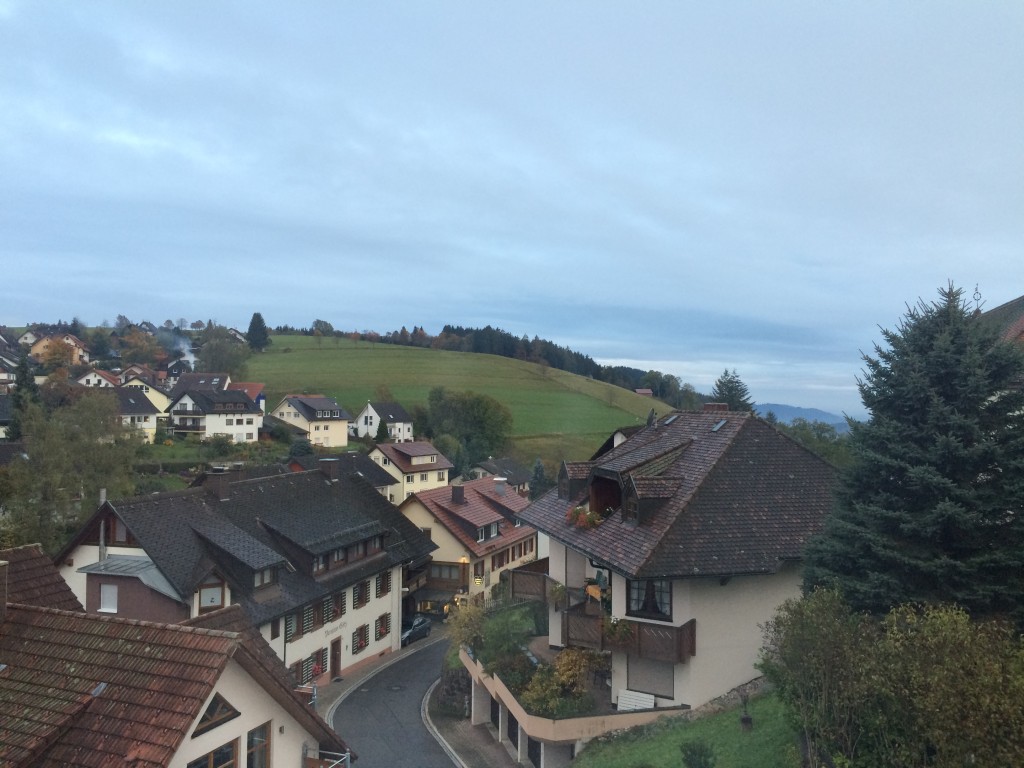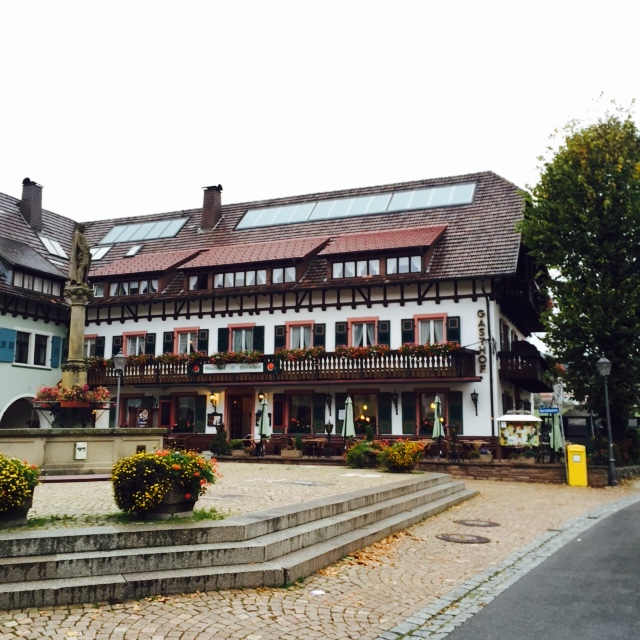New passport challenge
tests Bryn Mawr resourcefulness
but problem is solved.
Author Archives: Sarah Theobald
Don’s Daily Haiku
Quote
Wantonly burning
carbon, Lufthansa flies us
home for Thursday class.
Getting on Board
On the morning of our last full day in Germany, we returned to Freiburg for tours of a variety of community led or inspired solar technology applications. After confusing the regular commuters on the bus (why were there so few seats and so many not-quite-awake Americans?) and again appreciating the efficiency of the regional train system, we met up with our morning guide. Hans-Jörg Schwander, a very tall bike enthusiast and president of the Innovation Academy board, led us via tram to the Schwartzwald-Stadion, where the Freiburg soccer team plays. It also happens to be the first international soccer stadium powered by solar panels. Jenille, one of our student commentators today, explained how it came to be: “Tickets were very popular, and solar panels were expensive, so they used a lottery scheme to get people to fund the solar panels, which gave them priority in getting season tickets.” “The seats were going to be sold regardless, so the SportClub proved there was enough demand that they could fund these solar panels through ticket sales, and used that asset. I’ve been so impressed by people being able to leverage things that already exist,” says Jeremy, today’s other interviewee. Though a little disappointing not to get onto the field, we were excited to see the team coming in for practice as we left the stadium and walked along the Dreisam river.
Hans and Professor Don Barber explained the various ways that the river, which had once been groomed into a straight and narrow channel to feed a hydropower plant, was being renatured. “Willows were planted to reduce bank erosion, rocks were placed to meander the river and oxygenate water for the fish,” said Jenille. “There are a lot of things you have to take into consideration – if there’s a lot of snow, then the water that comes down from the forest includes a lot of sedimentation, for example.” The river still leads to a hydropower station (currently closed for repairs), and runs through a park, with playgrounds and bike paths. Jeremy “loved the focus on biking, giving them the right of way, having that be the primary mode of transportation” that we have seen throughout our time here. He has also been struck by the children “riding tiny bikes on actual streets,” which feels like a different kind of learning opportunity than kids in the States have.
We picked up a different tram line, and returned to Vaubon, where we had visited the Oko-Institut on Thursday. We walked around the neighborhood, and Hans explained the planning of the community, where groups of people bought parcels of land and worked with architects to create sustainably-built homes and community gathering spaces. Jeremy told me that he was “happy to hear that there’s a very intentional process of seeking out communal opinions on things. Hans didn’t act like everything was perfect, though, because some people that live in the community are ‘black sheep’. I didn’t want it to be too glorified, if there are some issues, but I was happy to see community-based development thriving anyway.” Jenille found some echoes of classwork in this and the other intentional communities we visited over the course of our time here:
In Political Science, we’ve been talking about the bottom-up movement, and how culture influences peoples’ decisions. We’ve seen that a lot, over the past week, like in Wyhl. There are things that people decided, it’s very unified, and they aren’t waiting on the government. Togetherness and community came up in what Hans was talking about, with families sharing plots of land. It’s a family concept, not just your neighbor or your friend.
Our day ended with detailed looks at a couple of solar houses.
First, the Heliotrop, a house built by the architect who designed the Sonnenschiff (where the Oko-Institut is located), which revolves on its base to follow the sun. Jeremy was disappointed to learn that plans for Heliotrop Hotels haven’t gotten out of the planning stages, so keep your eyes out for his next entrepreneurial adventure. Then, we actually got to go into one of theEnergy Plus houses in the Sonnenschiff development, and speak with the owner of the house. “The whole concept is to reduce your consumption” observed Jeremy. When Jenille asked the homeowner what the advantages of living there were, she responded that it was the sense of community that meant the most to her. It doesn’t hurt that she earns about 3,600 euros annually from the solar energy she sells back to the grid.
We wrapped up the day with a conversation on a playground(college students are all about slides, I’ve learned) in the Sonnenschiff development, and said goodbye to Erhard, who gave us such a broad view of the different initiatives in and around Freiburg. As Jeremy and Jenille looked back over their time here, each noted that long term perspectives were particularly important to the work that has been done in the area. Jeremy “admired how the forest ranger said they make decisions on a 150 year cycle – that’s some forward thinking that is not in everyone’s culture.”
Tomorrow, we leave very early, taking a bus, a train, a train, a plane, a train, and a train back to campus. Of course, everyone will be very enthusiastic in Geology class on Thursday morning.
About our guest commentators:
Jeremy Graff Evans is a sophomore at Haverford College, likely majoring in Political Science, with minors in Environmental Studies and International Studies, but he’s not quite ready to put a label on anything yet. He was awakened to the threats to global stability of climate change through a high school course, and felt this 360 was an ideal way to explore the problem further, using the cluster to informer both personal and career decisions. He is on the basketball team at Haverford, and when not at practice, manages to find time to sing in the S Chords (an a capella group on campus), sit on the Committee for Environmental Responsibility and the Rufus Jones Leadership Institute Board, and work at the fitness center. All that, while spending most of his academic time at Bryn Mawr this semester.
Jenille Scott is a junior Biology major at Bryn Mawr College, originally from Jamaica. She plans to go into environmental law after graduation, and was excited to mix the science and politics (a true liberal arts perspective!) of Climate Change in this 360. Her list of campus commitments is long, and includes President of BACASO, supervisor at Erdman Dining Hall, and Green Ambassador.
Don’s Daily Haiku
Quote
Turn to sun for light,heat & power, but keep coolshade insulated.
Don’s Daily Haiku
Quote
Stadium updatescut emissions while river
regains its old form.
Getting Sunshine (Finally!)
When we woke up this morning, there were hopeful hints of blue skies behind the clouds, and by the time we had boarded our bus (the only private transportation we’ll take the entire trip), there were definite rays of sunshine. Today’s itinerary included several farms and other sites off the beaten track, including a series of windmills in the Freiamt region.
The community of Freiamt produces 200% of its electricity needs (twice as much as it needs each day) from renewable energy sources. We started our day by visiting a biogas plant that makes use of co-generation technology, allowing it to produce both heat and electricity by fermenting grass and manure gathered from the land, then burning the gas. The plant produces over one million kilowatt hours of electricity annually, and heats 19 apartments and the local elementary school.
The second farm we visited is more self-contained, where the wood pellet heating system is used to heat the house, and freshly collected milk is used to warm the household hot water (another example of heat transference co-generation). “This is apparently a 20-year-old technology that everyone has, and it’s mind blowingly obvious,” Mercedes explained. Reflecting further on the contrast between today and the rest of our trip, she notes “they have all of these technologies… at these places that are still farms. In my head, farms aren’t industrialized. But the idea that we have to use everything, in a pre-modernized lifestyle, is following this new sense of energy and renewable resources. We have all this stuff that we’re using so that it doesn’t go to waste. In Philosophy [class] we’ve talked a lot about modernization being finding new ways of needing unnecessary things. In this sense, [the renewable energy] technology is being created so as not to be wasteful, which is super cool.”
Rina, our other commentator, also found a lot of opportunities today to think about the bigger picture: “In class, Professor Dostal got us thinking about how much we are supposed to depend on technology, but I’ve realized that it’s all human connections that make this technology work. 108 people contributed to fund [one of] the wind turbine[s] we visited,” which is just a piece of technology. In class, the discussions have been around whether the possibilities include a human/technology co-existence or co-dependence, and whether human ability will be taken over by technology, or will be able to keep it in check. Rina thinks the success of Freiamt may mean that the connection is a balanced one.
The second half of our day was spent in the neighboring villages of Wyhl and Weisweil, home of the anti-nuclear protests of 1974 we’ve been referring to throughout the trip. Professor Carol Hager has done substantial research in the region, and she had the opportunity to present on her recently published book (NIMBY is Beautiful) to some of the people who are featured in it. First, though, we met with the vice mayor, who gave a brief overview of the protests. Rina has been impressed at the access to interesting people we’ve been granted, mostly through the connections of our faculty, and the Innovation Academy. “We got to talk to these bad ass women who kept a nuclear plant from being built – it’s everything we tell ourselves [as Mawrters] we want to be and everything we are told we can be, and the vice mayor was just there, telling us about it,” she said, about the interaction we had with the Women of Wyhl, who formed the backbone of the protests, since their bosses were more lenient, and their families were depending on their success.
After the book party, on our bus ride home, the class chatted about their takeaways from the day. These conversations often compare the German approach to US policy, but Mercedes realized that “our tours have been in villages and smaller places. We keep trying to apply things from St. Peter to Boston, but you’d have to get to a smaller suburb to draw the parallel. Going back to citizen engagement and involvement, the lessons here can’t be applied just anywhere.” Though it sounds a little down, she suggests that each community is an opportunity for someone to figure out the right set of circumstances and incentives to effect change in that particular space. Tomorrow, we will have more opportunities to learn about such initiatives, as we tour a solar-powered soccer stadium, a hydropower plant, and return to the community of Vaubon, for a look at the inside of an energy positive house.
About our guest commentators:
Mercedes Aponte is a sophomore, planning to declare a Geology major and Environmental Science minor. She was encouraged by past 360 students to look into the program, and thought this cluster would be a good way to explore her interest in Geology. Her hula hoop skills are pretty legendary, and she’s convinced she could light a lightbulb just by hula hooping, given the right energy gathering equipment. In other news, she almost fell into France at the Rhine today.
Rina Patel is a sophomore Growth and Structure of Cities major, originally from Chicago, where she used to host a game show for the largest science center in the western hemisphere. The show was called “It’s Predictable,” and she had a Bob Barker microphone. Her interest in 360s dates all the way back to her very first Bryn Mawr event, a presentation about the Modern Art 360 at the Art Institute of Chicago, where she sat with Jiji Plecha, of all people. Though her original plan was to just take the Political Science class, her Dean and Professor Hager convinced her that the whole 360 was worth it. She agrees.
Don’s Daily Haiku
Quote
Sun shines in Freiamt
Yet biogas gives heat plus
electricity.
Getting a Break
Today was our free day – planned to give everyone the chance to catch a breath, re-orient to our time in St. Peter, and get ready for our last few days in Germany.
First, though, we had a breakfast meeting with two local community leaders, responsible for spearheading the wood pellet heating plant we visited yesterday, and other green initiatives in St. Peter. Coco, today’s guest commentator, notes that “the major incentive to join the program was an economic one. We’ve talked a lot in the past few days about how economics are an important incentive to get people to jump on the bandwagon. Even in a small village where everyone knows everyone, you would think people would be influenced by personal relationships, but the economic incentives are still the thing that gets them to join up.” Werner Rombach, who also owns the hotel where we’re staying, highlighted the involvement of key players, like the monastery, the school, and hotels, who were all early signers-on and whose standing in the community lent credibility to the project.
Coco has also been struck by the particular situations we have encountered in the Freiburg area, and in St. Peter. “After looking at the whole industry of green projects, it feels like each project has its own unique features and it’s only possible in that exact place, time, and with that group of people… we think it’s the technology we want to learn from [as students] but the techniques and conversations are much more important.” When I mentioned this to Professor Hager this afternoon, though, she was quick to emphasize that every community has a particular situation which can be shaped to the advantage of green-minded activists.
In reflecting on her experiences thus far, Coco said, “the whole trip carries the feature of ‘living the good life,’ which in this sense is living an environmentally friendly life – walking places, taking public transportation.” From take out boxes actually the size of the leftovers they contained (very small) to the consistency with which she’s seen people using the public recycling collection bins to the number of baby carrier bike attachments she’s encountered, Coco has found lots of places to train her eco-lensed mind, and she is excited by the pride she sees people taking in these efforts.
After our conversation at the Burgerstuble, the students (and faculty) scattered to a variety of local activities – a folk music festival in the next town over, clock shopping in Freiburg, hiking in Waldkirche, visiting a village on the Rhine (and waving at the French border), a Monteverdi concert in the monastery of St. Peter, and probably quite a few naps. We will reconvene tomorrow for more meetings with local leaders, a few farm tours, and a book party for Professor Carol Hager’s new publication, “NIMBY is Beautiful.”
About our student commentator:
Coco Wang is a senior Philosophy and Political Science double major at Bryn Mawr College. Right around the time applications for this 360 were available, she came across Under the Dome (the documentary on air pollution), which got her thinking about how people live in their environments, damage them, and don’t do anything about it. As an international student from China, often considered the largest polluter in the world, she wanted to tie the policy to the science of climate change, to better understand the actual problems being discussed. She was also excited to get to travel with both of her major department chairs, and her Senior Class Co-President (Chanel). Yesterday brought the most excitement she’s had all semester though, because it actually snowed.
Don’s Daily Haiku
Quote
Snowy forest near
St Peter makes us pine for
renewable heat.
Don’s Daily Haiku
Quote
Thinking of sunshine
on a cool cloudy morning
but when is lunch?

